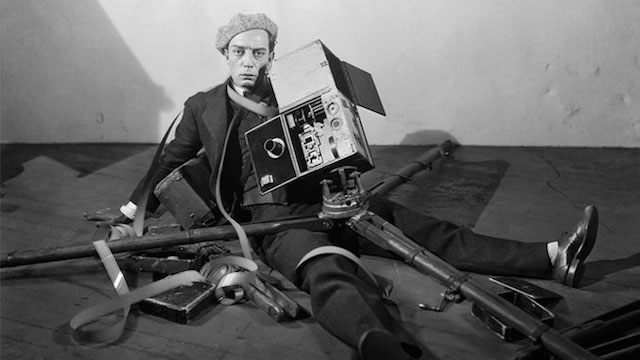And from the days of John the Baptist until now the kingdom of heaven suffereth violence, and the violent take it by force.
— Matt. 11:12 (KJV)
“Martyrs are exceptional people. They survive pain; they survive total deprivation. They bear all the sins of the earth. They give themselves up. They transcend themselves… they are transfigured.”
— Mademoiselle, Martyrs (2008)
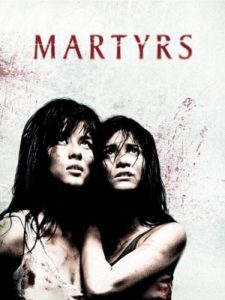 Martyrs settles in to a reality that is recognizably modern and European, while unsettling the audience by entertaining the grand conspiracies of organizations pulling the strings behind the dark curtain. Our entry point into the film is a young girl, barely dressed, stumbling down an industrial roadway screaming into the grey, downcast sky. We don’t know if she is being chased, or what, but we know that she has been through hell and somehow has come out alive. We aren’t told about where she came from until a ways into the film. The audience is given no explanation, no cinematic “fade in” to the film, simply disorientation.
Martyrs settles in to a reality that is recognizably modern and European, while unsettling the audience by entertaining the grand conspiracies of organizations pulling the strings behind the dark curtain. Our entry point into the film is a young girl, barely dressed, stumbling down an industrial roadway screaming into the grey, downcast sky. We don’t know if she is being chased, or what, but we know that she has been through hell and somehow has come out alive. We aren’t told about where she came from until a ways into the film. The audience is given no explanation, no cinematic “fade in” to the film, simply disorientation.
The film opens with a multitude of questions and with each singular answer we are given a barrage of follow-up questions treading water right behind. What is made very clear through the duration of the film is that there is an collection of powerful people who are seeking out the modern-day incarnation of Joan of Arc. They are seeking out a feminine martyr in a world where religion is considered superstition–explained away by science and the passed down principles of rational empiricism. Their search is bolstered by the assumption that martyrs like Joan of Arc, in the midst of persecution and suffering, were given a revelation about what came after this life. That God touched them and gave them calm amidst the turmoil, a divine taste of the world to come; the kingdom of Heaven into which they would be ushered.
These people want answers of their own; they want to take that revelation by force, however. If they know what is on the other side of the void, then maybe they will find a way to secure their place in this new kingdom, this new life. This organization seeks to build a modern day Tower of Babel into the realms of the unknown on the backs of coerced, tortured, mutilated, female bodies. These women are not martyrs by their own will but are made martyrs by those were seek to make their bodies into property, blocks in their proverbial tower to divine knowledge.
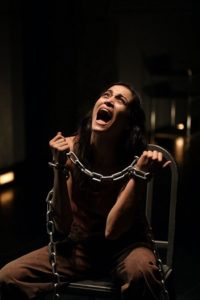 The terrifying beauty of this film is in the shape-shifting quality of Martyrs‘ narrative. As we get to know the young girl we saw at the beginning of the film, Lucie, we come to find out that she had escaped from this organization’s clutches and been placed in an orphanage, of sorts, where another girl, Anna, was given the task by those who ran the home to protect Lucie and discover what happened to her. The first part of the film follows Anna and Lucie, now grown up, as they search out those who had tortured Lucie so Lucie can seek vengeance.
The terrifying beauty of this film is in the shape-shifting quality of Martyrs‘ narrative. As we get to know the young girl we saw at the beginning of the film, Lucie, we come to find out that she had escaped from this organization’s clutches and been placed in an orphanage, of sorts, where another girl, Anna, was given the task by those who ran the home to protect Lucie and discover what happened to her. The first part of the film follows Anna and Lucie, now grown up, as they search out those who had tortured Lucie so Lucie can seek vengeance.
All the while, a naked, emaciated woman who seeks to harm follows Lucie. We are thrown off by Lucie, who we assume is our central protagonist, but is really a supporting character that allows Anna’s character to be developed. Anna, by a series of misfortunes, becomes the organization’s next potential Joan after the death of Lucie. The remainder of the film revolves around the captivity, torture and mutilation of Anna’s body as they seek the divinely chosen martyr.
It is during this segment of the film the audience is shown the importance of Anna’s actions leading up to this moment. Anna is profoundly selfless. She was loyal to Lucie, protecting her, nursing her back to health when she was harmed and helping her find the perpetrators who destroyed her life. However, she, too, is unable to believe in the violence done to those who most deserve it. At one point, unbeknownst to Lucie, she finds that one of Lucie’s victims is still, barely, alive and she attempts to save the person’s life by getting her out of the house before Lucie finds out. If we are paying attention, we see that the last person Anna is concerned for is herself.
She loves Lucie–in every way–but she doesn’t want to see others hurt either. She is already an embodied Joan of Arc in her sacrificial love for all. It makes sense, then, that she would be subjected to the evil of these people seeking out the afterlife by force. It also comes at no surprise that she is one of the very few the organization has found that survives the final phase of violence and is found to have the divine gaze towards the skies while her body (except for her face) has been completely skinned–tendons, muscles, veins, turned inside out.
What we do find out is that Anna is the only one of those with the divine gaze that has spoken of the revelation she’s been given. The woman that we assume is the leader of this collective of people, Mademoiselle, is the one to which Anna speaks the revelation. In the final moment of the film as these people have gathered to hear the revelation of Anna (d’Arc), the martyr, the audience is given a final conversation between Mademoiselle and her assistant as she takes off her makeup and headwear in the bathroom and he stands on the other side of the closed door. He asks her whether she has the revelation ready to tell those who have congregated. She says yes and asks him, basically, if he had ever wondered what happened on the other side of the veil of death. He responds, yes. We then see she has pulled out a gun and then she states, “Keep doubting,” as she places the barrel in her mouth and pulls the trigger.
The coerced revelation of Anna showed an existential despair, blackness, from the other side so powerful that those who receive it from the prophet (in this case, Anna) lose all hope and find no other response but to end their own lives and succumb to the justice of God.
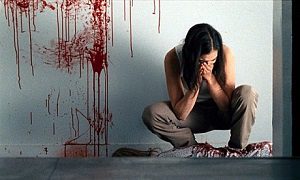 I would imagine that few Christians have seen this film. I would imagine the number is much smaller of those who watched this film and found it to be profoundly affirming of a Christian understanding of the world, of our reality. As I have thought about this film over the past week, I find it strangely embodying of a subversively Christian message. If we go back to the Biblical image of the Tower of Babel in Genesis 11, we see a story about sinful people forcing their way into the heavenly realms, trailblazing their own salvific path instead of seeking dependence on their Creator. God destroys the tower because, as they are, humanity is not fit to be within the realms of the kingdom of Heaven. Their disobedience still stains them and until that stain is removed, atoned for, they cannot come in. God destroys it and confuses their language–one more means for them to rely on God and not themselves.
I would imagine that few Christians have seen this film. I would imagine the number is much smaller of those who watched this film and found it to be profoundly affirming of a Christian understanding of the world, of our reality. As I have thought about this film over the past week, I find it strangely embodying of a subversively Christian message. If we go back to the Biblical image of the Tower of Babel in Genesis 11, we see a story about sinful people forcing their way into the heavenly realms, trailblazing their own salvific path instead of seeking dependence on their Creator. God destroys the tower because, as they are, humanity is not fit to be within the realms of the kingdom of Heaven. Their disobedience still stains them and until that stain is removed, atoned for, they cannot come in. God destroys it and confuses their language–one more means for them to rely on God and not themselves.
This collective of powerful people within the narrative of the film are doing the same thing. They are seeking their own Babel by breaking apart the bodies of non-consenting women. Many Christians may look at this ending and find a message of nihilism, that there is nothing beyond this life, that it is all nothingness. However, I don’t see it that way. I think the revelation while being nihilistic in content is only such because of the means used in acquiring the divine knowledge. I wonder if this word from Anna was a revelation to frustrate the existential tower that these people were attempting to build. Something akin to Psalm 14:
“The Lord looks down from heaven upon the children of men,
To see if there are any who understand, who seek God.
They have all turned aside,
They have together become corrupt;
There is none who does good,
No, not one.
Have all the workers of iniquity no knowledge,
Who eat up my people as they eat bread
And do not call on the Lord?
There they are in great fear,
For God is with the generation of the righteous.” (v. 2-5, NKJV).
Those who seek to save themselves especially by turning human flesh into a used and abused property (“eat up my people”)—especially as a means to force their way through the gates of the kingdom of heaven–are to be frustrated by a God who is just, His justice driven by love. The revelation these people receive from Anna by these evil means is the revelation they deserve since they rely on themselves and not the one who could actually redeem them. God gives them the very thing they seek: the end result of their tower of Babel.
Yet, the ending is still chilling because we are not given confirmation that this organization will cease their evil work in the face of their leader’s suicide. We are not assured it will end. Here we see the very real connection between the world of the film and the reality that we all know. Evil is sometimes brought to justice; sometimes it is not. Evil hasn’t been wholly brought to an end and doesn’t appear to be coming to an end anytime soon.
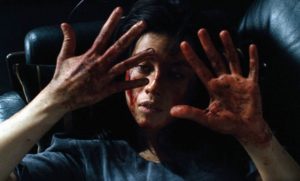 People will continue to use others to seek their own means of becoming something they cannot become: gods. That goal always ends in evil and violence done to others, whether physically, emotionally, etc. Anna’s “giving in”, her dependence, not on herself, is a picture of persecution and suffering that leads her to a “word from God” to the evildoers. She becomes a prophet, speaking judgment to those who have turned their face from God and done violence to their fellow image bearers of God.
People will continue to use others to seek their own means of becoming something they cannot become: gods. That goal always ends in evil and violence done to others, whether physically, emotionally, etc. Anna’s “giving in”, her dependence, not on herself, is a picture of persecution and suffering that leads her to a “word from God” to the evildoers. She becomes a prophet, speaking judgment to those who have turned their face from God and done violence to their fellow image bearers of God.
Martyrs delivers the final word from God to those who seek to forcefully enter into the very place they do not deserve to be: to rely on your own understanding and power to enter heaven will always be frustrated by God; leading to God turning his face from us and giving us over to our hardened hearts and the judgment of the Law.


